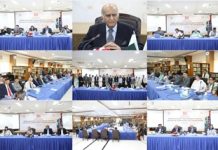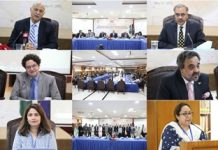Press Release
Panel Discussion
Biden Administration: Options & Challenges for Pakistan-US Relations
April 22, 2021

Centre for Strategic Perspectives (CSP) at the Institute of Strategic Studies Islamabad (ISSI), in collaboration with the Area Study Centre for Africa, North & South America, at the Quaid-e-Azam University Islamabad organized a virtual panel discussion on “Biden Administration: Options & Challenges for Pakistan-US Relations”. The panelists included Dr. Hassan Abbas, Professor, NDU, Washington D.C., Dr. Kenneth Holland, former President, American University of Afghanistan, Dr. Rasul Bakhsh Rais, Professor, Department of Humanities and Social Sciences, LUMS, and Dr. Hussain Shaheed Soherwordi, Associate Professor, University of Peshawar. The panel discussion was moderated by Director CSP, Mr. Najam Rafique.
Ambassador Aizaz Ahmad Chaudhry, Director General, ISSI, while making his introductory remarks stated that historically, the relationship between Pakistan and the US has been based on security issues and has been nothing less than a rollercoaster ride. The Biden administration is losing interest in two most critical areas in which Pakistan was relevant – counter-terrorism and Afghanistan. Moreover, the geostrategic changes that are happening in the region like the US competition with China and the growing India-US strategic partnership and the situation in Afghanistan will impact Pakistan’s relation with the US. Furthermore, the recent shift by Pakistan from geostrategic to geo-economic will also impact the nature of relationship, and whether US will be a partner to pull Pakistan out of it economic woes or exploit it to fulfil its own strategic objectives.
Dr. Kenneth Holland, in his remarks, stated that Pakistan is the most important neighbor for the US in its fight as well as stability in Afghanistan. This also makes Pakistan an important partner for the US for an indefinite future. He was of the view that Pakistan has been a critical partner in every way for the US throughout the peace process. However, the importance may reduce once the US troops leave Afghanistan. However, the US will continue its counter-terrorism mission in Afghanistan but over the horizon, and in this regard may require Pakistan’s help in the form of its bases to fight against ISIS and terrorists in Afghanistan. He further opined that the US is concerned about China’s growing relations with Pakistan and cautioned that it will be in favor of Pakistan to not pick sides in US-China rivalry.
Dr. Hassan Abbas observed that counter-terrorism is no more a top priority of the Biden administration. Washington’s interest in South Asia remains important, and the US is not walking out of the region but is only refocusing. The security relationship between Pakistan and the US has been problematic throughout its existence. In this regard, US relations with Pakistan need to be rebooted. Moreover, Pakistan continues to be an important country for the US and its stability is far more important than any other country in the region. He was of the view that the military footprint of the US will be no longer in Afghanistan, but there will be a presence of humanitarian and Intel footprint. Reflecting on the issue of Indo-US relations, Dr. Abbas stated that the Indo-US relations have been on the rise since many years and the reason is that the top tech and AI companies, as well as American businesses have the opportunity to talk with Indians in terms of investments and in return emphasizing its strategic relationship.
Dr. Rasul Bakhsh Rais while commenting on the post withdrawal situation in Afghanistan stated that the future of Kabul depends on how the endgame plays out in Afghanistan. Pakistan has to be mindful whether it has the capability, capacity and the ability to deal with an Afghanistan that relapses into a civil war. He shared three possible scenarios in the aftermath of US withdrawal; firstly, a stable Afghanistan after a peace settlement; secondly, an irresponsible withdrawal by the US without any peace insurance; and lastly, Afghanistan relapsing into a civil war. He was of the view that Pakistan does not have the means either diplomatic, economic or security to deal with an unstable and violent Afghanistan. On the question of normalization of relations between Pakistan and India, he was of the view that there is a desire in the US that Pakistan and India should work to normalize their relations, however, US will not like to move beyond pushing both the sides to the table.
Dr. Hussain Shaheed Soherwordi was of the view that Pakistan’s top priority should be to fix its economy which will be illusive without a good security situation. The latter will be a challenge if Pakistan has an unstable neighbor on its west. While Pakistan and Kabul have a sincere will to work for the better, this should also be witnessed in the trade and economic sector. Bilateral trade between the two has significantly reduced and has yet to come to a normal level. He further expressed that the US looks at Pakistan through the lens of either Pakistan relations with India or through Afghanistan. This politics of lens should come to an end. Moreover, US cannot be holding Pakistan responsible for either the success or failure of the peace process. Numerous stakeholders are involved in the peace process and the success and failure must be shared equally. Dr. Soherwordi made note of the fact that the Taliban today have gotten more mature and pronounced in their policies.











